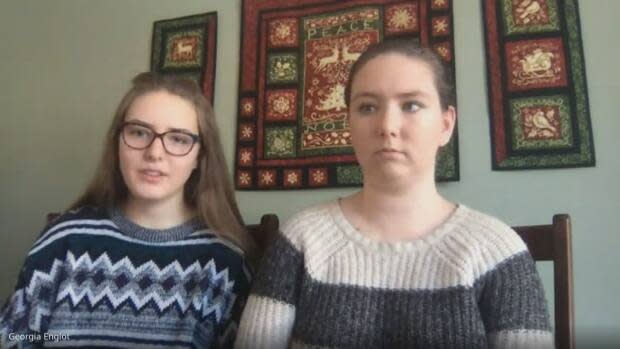Edmonton family diagnosed with COVID-19 warns of stigma, challenges of isolation
Renée Englot woke up in the night feeling nauseous, her mouth dry, head pounding.
She was the first in her family to fall ill.
Englot tested positive for COVID-19 on Nov. 15. Within three days, her husband, Curtis, and daughter, Sadie, 17, had also been diagnosed.
Within nine days of Englot's diagnosis her eldest daughter, Georgia, 20, also contracted the disease.
Like thousands of other Albertans who have been diagnosed and sent into confinement, the family's daily lives have been upended.
"The reality of three people having and then one doesn't, it was so complicated to try to work through," Englot said in an interview from her home in Edmonton.
"And the reality is that we were staggered, so it's a longer isolation period than 14 days. It was more complicated than we expected."
'A huge impact'
Englot is urging other Albertans to take the virus seriously. She said her family has experienced mild symptoms but their time in isolation has been a frustrating ordeal.
She said her family has struggled with the anxiety of being sick, the logistical challenges of quarantining from one another, and the stigma of contracting the virus.
"We're lucky enough that we haven't required medical attention," Englot said Tuesday. "But it is still a huge impact. And 17 days later, it's still making its presence felt."
Englot said she worries that other families will struggle with the challenges of isolation, and the ordeal of warning their close contacts that they could be infected.
She said with limited contact tracing being done by provincial health officials, the onus is often on individuals to notify their close contacts and navigate isolation protocols.
"I understand that we have to take some responsibility and help with it, that the system is very overwhelmed right now," she said. "But having sick people trying to read complicated instructions and reach out and follow people, it's not really a recipe for success."
Englot said her diagnosis was frightening. Her results were sent via text message at 2:30 a.m. on Nov. 15.
"I got no sleep after that," she said. "The worry set in. You know, what will it mean for my family? Will they be OK? Who have I been in contact with? Who else might we have put at risk? And then how do we manage and keep isolated from each other?"
The following morning, the rest of the family scheduled tests and started calling their short list of close contacts.
The couple and their youngest daughter began quarantining in the master bedroom, their meals left at the door.

For Georgia, it was a particularly stressful time. A student at the University of Alberta, she was juggling course work with the demands of three unwell family members unable to leave their rooms.
By that weekend, the family switched places. The master bedroom was sanitized and Georgia moved in, in an attempt to protect her from extended interaction with her infected family members.
Then, she began to feel unwell. Her third COVID test came back positive.
"It was so weird, how am I supposed to stay safe now that my entire family has this?" she said.
"I'm very frustrated. It's a bit like we took all of the precautions we could and still caught it, but there's nothing we can do about it."
Georgia and her family, still suffering from flu-like symptoms, have a few more weeks of isolation ahead.
"Being together is definitely a plus, but I'm still a bit worried, worried that if we leave isolation too early it might pass it on to people," she said.
"We're definitely trying to take things slowly."
It's not just numbers, it's people. And probably people you know. - Renee Englot
Renée Englot said she still has no idea how they contracted the disease. She had no known close contacts who were sick and she and her family were following health guidelines, taking precautions.
She said people who have tested positive need to speak up. She said assumptions that people who have become infected acted irresponsibly are dangerous.
"We need to do more about saying, 'I have it,' so that people realize it's not just numbers, it's people. And probably people you know."

